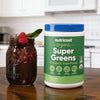Alpha Lipoic Acid: The Universal Antioxidant

If you’ve been going out of your way to squeeze as many antioxidants into your diet as possible and somehow haven’t heard of alpha lipoic acid, then you’re missing out!
Alpha lipoic acid is present in the mitochondria, the powerhouse of the cells, and takes part in crucial energy creating reactions. Humans only produce ALA in small amounts, and so we must get the rest from outside sources such as food or dietary supplements.
What Does Alpha Lipoic Acid Do?
Alpha lipoic acid (ALA) is known as the “universal antioxidant” because of its ability to dissolve in both water and fat. Other antioxidants like vitamin C and vitamin E dissolve in only one or the other. If other antioxidants are like fish or mammals, then ALA is an amphibian! Because it is both water and fat soluble, it can neutralize free radicals anywhere in the body.
Not only that, but ALA can also replenish other antioxidant stores. When an antioxidant like vitamin E neutralizes a free radical, it becomes inactive and floats around, useless, in your system. ALA has the power to reactivate these inactive antioxidants so that they can get back to doing what they do best: eliminating free radicals!

These effects combined make ALA a powerful tool for reducing oxidative stress which can cause harmful effects in the human body if not addressed.
Diabetes and Neuropathy
The diabetes epidemic shows no sign of slowing down. According to the World Health Organization, the number of people with diabetes rose from 108 million in 1980 to 422 million in 2014.
Recent studies have shown that diabetes is likely associated with increased oxidative stress. For this and other reasons, many European countries consider ALA a regulated drug and have approved it for treatment of diabetes-related complications such as neuropathy.
One study concluded that ALA “enhances glucose uptake” while another said that it “proved functionally beneficial to skeletal muscle glucose uptake, whole-body glucose tolerance, and helpful against insulin resistance.”
Memory Loss and Alzheimer's
Cognitive decline is another condition which has been linked to oxidative stress, and in this area as well, ALA has yielded some promising results.

In one study performed on mice, “ALA treatment was shown to reduce memory deficits, significantly improving learning and memory.” Another study found that LA supplementation improved both spatial and temporal memory” in old rats.
While exactly how ALA accomplishes this is not quite known, some researchers hypothesize that ALA is able to reverse age-associated loss of neurotransmitters in the brain. These effects may help prevent cognitive decline as well as Alzheimer's.
Glaucoma
The effects of oxidative stress spread even to our eyes. Free radicals damage neurons and tissues, and our eyes are one of the most complex and finely tuned instruments in our bodies. Only recently are studies beginning to show the damage of oxidative stress on vision, including an increased risk of glaucoma.
One study concluded that “Oxidative stress does indeed contribute in a meaningful way to glaucoma pathology and should thus be incorporated into treatment plans.”
Because of ALA’s powerful abilities to both neutralize free radicals and rejuvenate inactive antioxidants, it may provide more relief for oxidative stress than other antioxidants.
Weight Management
Did you think that alpha lipoic acid was only good for dealing with free radicals? Think again!
With regards to obesity, one study found “significant reductions” in BMI and fat mass, circulating levels of fatty acids, body weight and waist circumference as a result of ALA supplementation.
Another seconded that conclusion by saying, “Moreover, [ALA] has the potential to improve the lipid metabolism and promote weight reduction in obese patients.”

Natural Sources
Because the human body only produces alpha lipoic acid in small amounts, most of what we get must come from food or supplements. If you’re looking for natural ways to increase your intake, the following foods are all good sources of ALA.
- Beef
- Pork
- Other Red Meats
- Organ Meats (Kidney, Liver, Heart etc.)
- Broccoli
- Tomatoes
- Spinach
- Brussels sprouts
Conclusion
Alpha lipoic acid is the only antioxidant which can dissolve in both water and fat. Because of this, it is often called the “universal antioxidant.” It also has the ability to activate other antioxidants such as vitamins C and E after they’ve become inactive.
Research suspects that it is these properties which underlie alpha lipoic acid’s possible use in treating such conditions as diabetes, memory loss, glaucoma, and obesity in humans. Though research is still limited, the early returns have been promising.
Sources
https://www.ncbi.nlm.nih.gov/pmc/articles/PMC5732919/
https://www.mayoclinic.org/diseases-conditions/diabetic-neuropathy/symptoms-causes/syc-20371580
https://www.ncbi.nlm.nih.gov/pmc/articles/PMC3221300/
https://www.ncbi.nlm.nih.gov/pmc/articles/PMC8348748/
https://www.ncbi.nlm.nih.gov/pmc/articles/PMC7403706/
https://www.ncbi.nlm.nih.gov/pmc/articles/PMC7085885/
https://pubmed.ncbi.nlm.nih.gov/32692358/
https://www.ncbi.nlm.nih.gov/pmc/articles/PMC2756298/
https://www.ncbi.nlm.nih.gov/pmc/articles/PMC6723188/
https://pubmed.ncbi.nlm.nih.gov/29990473/
-
Posted in
Antioxidants, Cognitive Health










